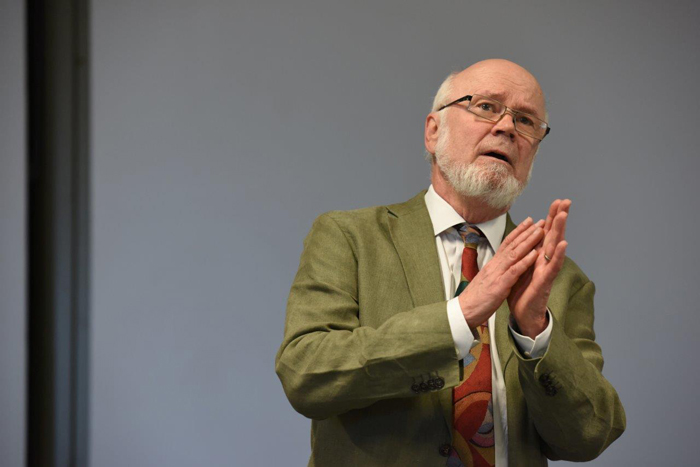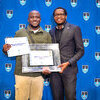The conundrum of provisional truth in science
26 February 2015 | Story by Newsroom
Most of the Universe is made up of matter scientists don't understand and have never seen. They know it's is out there because of the gravitational effect on stars and galaxies and its imprint on the Cosmic Microwave Background, but no one knows what it is.
Large sums are spent on experiments using powerful particle accelerators, hoping to find the truth about its composition. But in sciences like astrophysics, where concepts are often metaphysical and based on speculation, scientists deal in provisional truth and not absolute truth – making truth an elusive thing, says Professor Bengt Gustafsson.
Gustafsson was delivering a public lecture at UCT earlier this month on the emergence of truth in natural sciences. Hosted by the Academy of Science for South Africa (ASSAf), he was speaking in his capacity as the ASSAf Distinguished Visiting Scholar for 2015 on one of the first stops of a lecture tour.
A renowned astrophysicist with over 200 publications on the topic, Gustafsson has held posts at Stockholm and Uppsala Universities and is Corresponding Fellow at the Nordic Institute for Theoretical Physics. He also serves on the Nobel Committee for Physics.
In addition, he's published in cross-disciplinary areas such as research ethics, the social responsibilities of science, science-religion interaction, and science policy.
Taking the audience on a journey through the ages, he traced the emergence of the culture of measurement in society's quest for truth, through experimentation and demonstration.
"The process whereby a scientific hypothesis becomes 'true', or when postulated abstract objects acquire the status of existing reality, is fascinating and probably tells one more about humans and their culture than is generally believed," maintains Gustafsson.
In spite of their different attitudes and the different constructs scientists make to describe their data, he is still surprised by the general consensus among scientists like cosmologists, physicists and astronomers of "what is true, what is good".
"We know quite well what good science is. If it works, it works. As scientists, we squeeze the truth out of nature."
But is provisional truth enough, especially for a public asked to underwrite grand experiments based on theory?
For Gustafsson, celebrated for his popularisation of science (and astronomy in particular), the public is a key ally in the search for truth, as is science communication.
"We do expensive work and [expect] the taxpayers to respect it; otherwise they won't pay; they won't pay for the [particle] accelerators [for example].
"We tell them dark energy is there, and that we'll find it."
In thanking the speaker, UCT cosmologist Emeritus Professor George Ellis reminded researchers that it's important to step back from the workbench to ask these big questions, "...and think about these matters in our own areas of study".
"But really [there is] a problem with the idea of provisional truth when you're talking to the public about issues like global warming or climate change on the one hand, and things like vaccination on the other.
"Many in the academy here have been thinking about global warming... one of the most important things facing us in the future. How do you go to the public and say 'this is important, you've got to divert resources, but it's a provisional theory'? It's a real conundrum we're facing.
"And in the case of vaccination there's the most extraordinary thing happening in the US where vast swathes of intelligent people are refusing to have their children vaccinated – placing not only their own children's lives in danger, but other children's lives in danger.
"It's important not only for our own subjects, but [for] the implications of the way we talk about that to the public."
Story by Helen Swingler. Photo by Michael Hammond.
 This work is licensed under a Creative Commons Attribution-NoDerivatives 4.0 International License.
This work is licensed under a Creative Commons Attribution-NoDerivatives 4.0 International License.
Please view the republishing articles page for more information.










